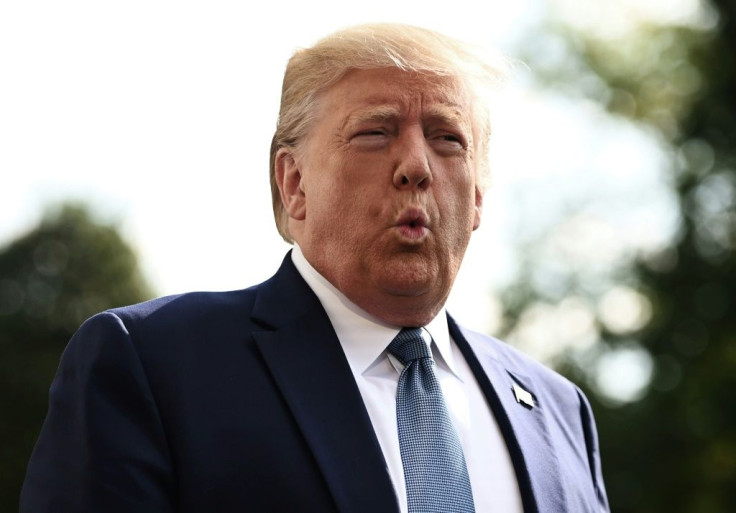Trump Isolated After Turning Back On Syria, Republican Allies

Despite a bizarre boast about his "unmatched wisdom," President Donald Trump found himself dangerously isolated Monday as his erratic policy on Syria infuriated the Republicans he needs to save him from impeachment.
The new Washington upheaval began late Sunday when the White House announced removal of US troops from the Syria-Turkey border area, adding that "Turkey will soon be moving forward with its long-planned operation into Northern Syria."
This was quickly interpreted as a green light for Turkey's powerful military to invade Syria and attack Kurdish militias they consider a terrorist threat.
The problem is those same Kurdish groups have fought loyally alongside a small US presence in Syria, doing much of the dangerous ground fighting in a campaign to drive Islamic State extremists from the region.
Trump, who issued the policy shift shortly after a phone conversation with Turkey's President Recep Tayyip Erdogan, insisted in tweets early Monday that the decision reflected his broader determination to end "ridiculous" US military entanglements abroad.
He dismissed the Kurds' sacrifice, saying they had indeed fought alongside US forces but were "paid massive amounts" to do so and "have been fighting Turkey for decades."
The Republican backlash was swift, intense and highly unusual from a party standing behind the president in the face of a Democratic party impeachment push for alleged abuse of office.
Trump moved to backtrack later Monday, issuing an extraordinary warning for NATO member Turkey not to overstep "anything that I, in my great and unmatched wisdom, consider to be off limits."
Otherwise, "I will totally destroy and obliterate the Economy of Turkey," he wrote.
Scrambling to stem the damage, the Pentagon warned that the United States does not endorse a Turkish military invasion of northern Syria, while at the State Department a senior official insisted the pullback concerned a "very small number" of troops.
Leaving Kurds 'to die'
The political damage, however, was already done.
In a rare rebuke, Senate Majority Leader Mitch McConnell -- the top Republican in Congress -- warned that a "precipitous" withdrawal from Turkey's border with Syria would only benefit Russia, Iran and Bashar al-Assad's government in Damascus, while increasing the risk of ISIS regrouping.
Another key voice against Trump was that of Senator Lindsey Graham, the Republican chairman of the upper house's judiciary committee -- and like McConnell a lynchpin in the defense against impeachment.
Calling abandonment of the Kurds "a disaster in the making" and "a stain on America's honor," Graham warned of a Senate resolution demanding the White House change track.

"It will receive strong bipartisan support," he said, while McConnell hinted at the same.
He threatened economic sanctions against Turkey if it invades Syria. Ominously for Trump, Graham said the level of support in Congress would make this "veto-proof."
There were strongly worded condemnations from other senior Republicans. Senator Marco Rubio called a US Syria retreat "a grave mistake," while Nikki Haley, Trump's popular former UN ambassador, said leaving Kurds "to die is a big mistake."
'Wisdom' and obliteration
Often railing against the costly occupations of Iraq and Afghanistan and -- despite his bellicose rhetoric -- holding off from military strikes against Iran, Trump believes he is responding to public fatigue over seemingly intractable conflicts.
"The United States was supposed to be in Syria for 30 days, that was many years ago," Trump said in one of his Monday tweets.
"Turkey, Europe, Syria, Iran, Iraq, Russia and the Kurds will now have to figure the situation out," he said.
Republican Rand Paul was one of the rare prominent voices backing Trump on "his promises to stop our endless wars."
But even many of Trump's own allies appear to have run out of patience with what critics have long seen as a chaotic foreign policy.
In September, Trump made the stunning announcement that he'd been on the verge of meeting Taliban guerrilla leaders to cap months of mostly behind-closed-doors negotiations on a US military exit after two decades of war.
Instead, Trump said in the same statement -- posted on Twitter -- he was canceling those talks entirely.
Trump has also kept the world on tenterhooks over his intentions in Iran, where he has given repeated mixed signals ranging from desire for historic talks to threatening war.
Trump's former envoy on the campaign against the Islamic State group, Brett McGurk, did not hold back.
"Donald Trump is not a Commander-in-Chief. He makes impulsive decisions with no knowledge or deliberation," he said.
"He sends military personnel into harm's way with no backing. He blusters and then leaves our allies exposed when adversaries call his bluff or he confronts a hard phone call."
© Copyright AFP 2024. All rights reserved.





















